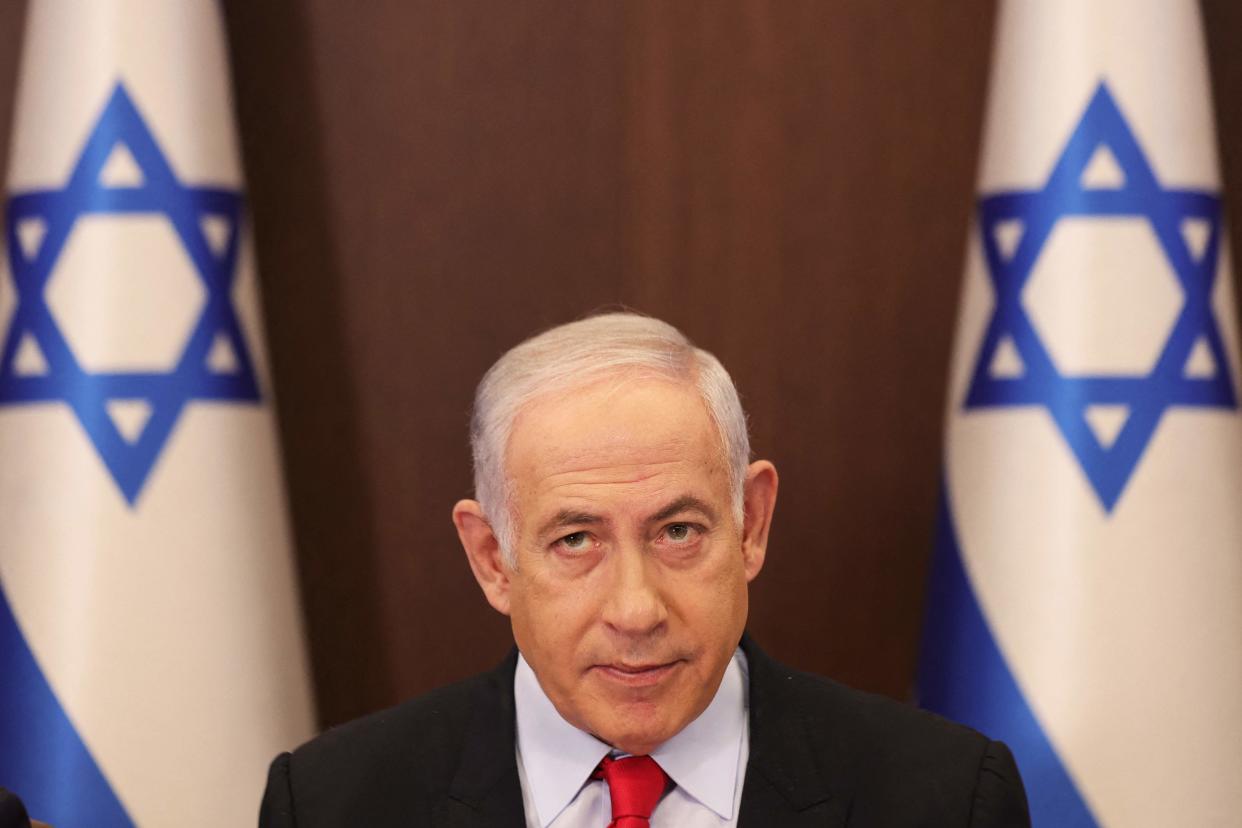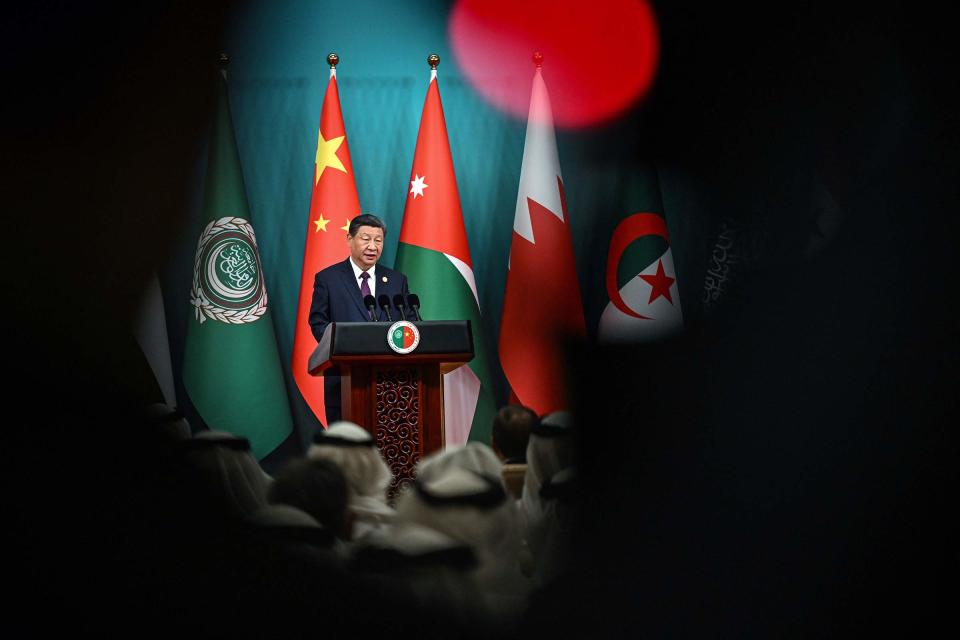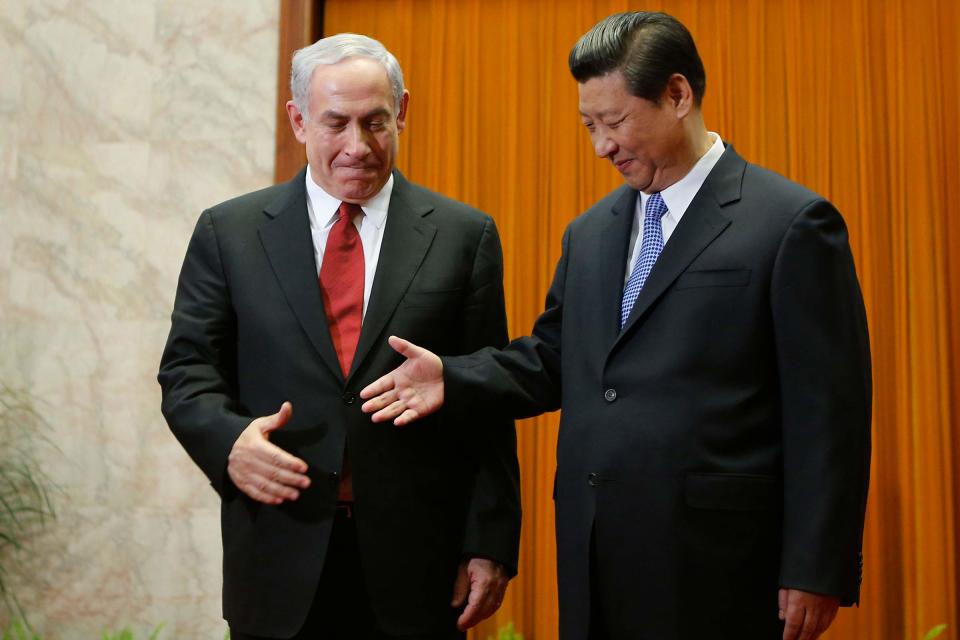How China Soured on Israel

Israeli Prime Minister Benjamin Netanyahu attends the weekly cabinet meeting at his office in Jerusalem on Sep. 27, 2023. Credit - Abir Sultan—AFP/Getty Images
It wasn’t so long ago that Israeli Prime Minister Benjamin Netanyahu called his country’s relationship with China “a marriage made in heaven.” And when Biden told reporters in March 2023 that he was not inviting Netanyahu to Washington given his plans to undermine Israel’s independent judiciary, Netanyahu announced a trip to visit President Xi Jinping in China instead.
For Israel, the trip was a reminder to Washington that there are other superpowers looking to deepen their ties with Israel. For China, it was an opportunity to raise the costs of the U.S.’ pivot away from the Middle East to Asia by signaling that Beijing could fill some of the void. Netanyahu’s ploy may have worked. Biden reneged in September and invited him to the White House.
That dynamic was upended in the wake of the Oct. 7 Hamas attack. During the current moment of strain in the Bibi-Biden relationship, Sino-Israeli ties will not be a viable pressure tool for Netanyahu because China has other plans. Beijing has distanced itself from Israel amid marked international criticism of its bombardment of Gaza—a move that is playing well around much of the world and serves as a counterpoint to Washington’s diplomatic and military support of Israel.

This approach has also supported China’s longer running goal of challenging its own reputation as a largely commercial player and the U.S.’ reputation as the Middle East’s diplomatic heavyweight. Since China successfully facilitated the restoration of ties between Iran and Saudi Arabia last spring, it has sought out further opportunities to position itself as an alternative to the U.S.-led international order. Throughout the Israel-Hamas war, Beijing has attempted to flex its diplomatic muscle, including publishing a peace plan, hosting reconciliation talks between the Palestinian Authority and Hamas, and holding summits with Arab and Muslim foreign ministers aimed at ending the fighting. None of these efforts have borne fruit but they are playing well in Arab and Global South capitals.
To exploit the growing wedge between the U.S. and key global actors, China has explicitly articulated its support for the Palestinian cause in international fora. After the U.S. vetoed a December U.N. Security Council resolution calling for an immediate ceasefire, China’s foreign ministry spokeswoman stated, “We regret and are disappointed at the U.S. veto … Close to 100 countries, including China, co-sponsored the draft resolution tabled by the UAE representing Arab countries.” Deepening its relationship with the UAE—a major oil producer, emerging innovation hub, and key U.S. ally in the Middle East—could provide China with the same opportunity Israel once did: an exploitable entry point to potentially access sensitive American technologies.
Still, China’s approach to the Israel-Hamas war has sparked fierce Israeli backlash. About a third of Israeli Jews have reported a negative change in their perception of China since Oct. 7 and some private sector leaders have called for exacting financial consequences, such as temporarily prohibiting Chinese companies from operating in Israel’s ports. Israel’s government has communicated its “deep disappointment” to PRC officials and taken measures that have undermined relations, including sending a parliamentary delegation to Taiwan, where Chair Boaz Toporovsky took aim at nearby China in his public comments, saying Israel and Taiwan “have much in common as small but strong democracies in a harsh environment.”

All that said, other PRC geopolitical interests could ultimately drive Beijing back toward Tel Aviv. China’s desire to shore up ties with U.S.-friendly Gulf States has been a key driver of its Gaza policy. Yet China’s refusal to condemn Hamas and its labeling of Iran’s missile attack on Israel as “self defense” have exacerbated concerns in the UAE and Saudi Arabia that the U.S. is an irreplaceable partner. While China casts the U.S. as a warmonger to advocate for a Chinese-led world order that resolves conflicts without military force, many Gulf countries see Biden’s ironclad military backing of Israel as the U.S. support they have long desired. (Even as they have publicly criticized Israel’s conduct, reflecting popular opinion in these countries.) Beijing may not aim to fully supplant Washington in the region as the Gulf countries’ security guarantors, but it is still hoping to capitalize on this opportunity to strengthen its relationships with Abu Dhabi and Riyadh. To do so, it may adopt rhetoric more in line with theirs, and, in the process, Washington and Tel Aviv’s preferences.
China and Israel also have financial incentives to maintain a relationship. Israel’s war has shrunk its GDP and hurt its credit rating, creating obstacles for Israeli firms looking to raise funds. China is the world’s second largest economy and was Israel’s third largest trading partner the year before Oct. 7, making it essential to Israel’s economy. Meanwhile, Chinese investors are facing a lagging domestic economy and pursuing investment opportunities abroad. This dynamic could generate a mutual—albeit reluctant—desire to bolster commercial ties.
For Palestinians horrified with the U.S. and its largely unconditional support for Israel, China’s emerging interest in the conflict seems like a positive development. But China’s current pro-Palestinian stance may simply reflect that today, a public relationship with Israel is more of a liability than asset in the U.S.-China rivalry. If that changes, China’s position on Israel will likely follow suit. China’s support for Palestinians appears to be mostly superficial, and even its vague peace plan puts most of the onus on the U.N., not Beijing, giving it the future flexibility to pivot on this issue and leave the Palestinians once more without a great power.
Like Israelis, Palestinians may too soon discover that China is a fair-weather friend, and a relationship with it is not a marriage made in heaven.
Contact us at letters@time.com.

 Yahoo News
Yahoo News 
